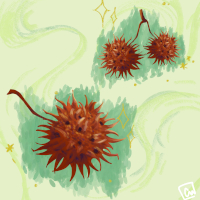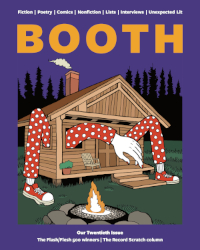Fiction by Georgia Jackson
A baby appeared yesterday, crying in the center of the claw-foot tub. And while she arrived with no certificate of birth, I know that she is mine. So I swaddle her in flowery yellow because that’s what you do with babies: you swaddle them. The yellow pillowcase is incidental and one of the many remnants left behind by my parents, who backed out of the driveway in a secondhand Winnebago last June, their GPS programmed for Yosemite.
Baby doesn’t do much yet. She’s all small with gooey limbs and big eyes, and after I bathe her in the sink, we sit in front of the mirror and count the ways we are the same and the ways we are different. Between the two of us, we’ve got four green eyes, and twenty fingers and toes, but Baby is bald and so I drape my dark curls across the soft bridge of her head and imagine our future.
When the weather warms, I introduce her to the garden behind our house. A wooden fence ensquares the small yard, and last year’s ivy clings to the wooden structure, climbing drily over the top and into neighboring lawns. I crouch, holding Baby low to the ground and bouncing her feet on the cobbled bricks like she’s walking herself.
“These are flowers,” I say. “And look! This is a butterfly. Do you see it, Baby? You’re walking so good, and all by yourself.”
Radio sounds spill into our little world from the other side of the fence.
“Do you hear that, Baby? Music.”
We sit in the garden every day, spoon-feeding/spoon-eating mushed Gerber flavors and watching as the grass turns green again. Together we try sweet potato and banana, pear and mango, apricot and squash. And, like most other young children I’ve met, she begins to smell like peaches.
I can tell Baby really likes the garden, and I decide to dig a hole and plant her in it.
“You’re exactly what this place was missing,” I say, sprinkling dirt on her bald head. I check on her every day after, fertilizing her with what’s left of the Gerber mush and powdered formula.
She grows quickly, her limbs shooting upward and out. I wonder what kind of tree she will become.
Her dark green leaves unfurl as the summer sun heats up, and I visit her in the afternoons and watch as she dances in the humid air. By August her arms hang low, heavy with peaches.
When she is ripe, I pluck her fruit, collecting the soft, fuzzy orbs into the old floral pillowcase. And when the case is full, I take it inside and mix her fruit into a cobbler complete with cinnamon, brown sugar, and nutmeg.
Afterward, I walk through our overgrown front lawn, past the wilted Cherokee roses I’ve been neglecting, and over to the neighboring house, cobbler in hand.
Patrick answers the door.
“You got ice cream?” I ask. I haven’t come by since Baby showed up, and he’s surprised to see me but leads me through the house and into the backyard anyway.
From the patio, I hear him wrangling up a tub of Bi-Lo vanilla from the freezer that, like the rest of the house, used to belong to his parents.
When Patrick reappears and the ice cream is actually from Winn-Dixie, I gesture to nothing in particular and say, “Something’s different.”
“Summer happened,” he says, nodding toward the fence we share. Baby’s branches are swung low over the wooden divide, and last season’s ivy is crusted between the slats. “And now your yard’s trying to take over.”
We sit in his dad’s old lawn chairs, each with a slice and a scoop and a fork, and it makes me think—about loneliness and second chances, mostly, but also about how the wind moves through Patrick’s hair and Baby’s leaves in the same way.
“What do you think?” I ask.
He nods, eyebrows raised and mouth full of peaches.
I take a mental picture and promise myself I’ll hang it on the wall in the foyer above the black and white of my parents and kid-me. I wonder whether Patrick might like one, too. And then I take a bite from my own plate, and I don’t stop until there’s nothing left.



